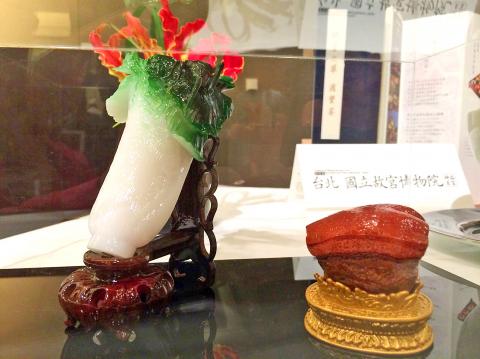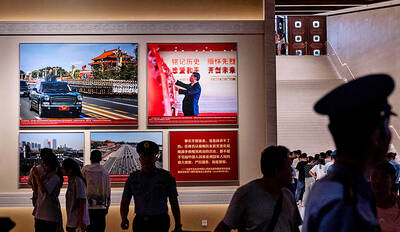The National Palace Museum’s most popular artwork — the Jadeite Cabbage with Insects — is to go on display at the trial opening of the museum’s southern branch in Chiayi on Dec. 28.
The Jadeite Cabbage with Insects is to be exhibited at the southern branch from Dec. 28 this year until Oct. 2 next year, museum Director Feng Ming-chu (馮明珠) said on Wednesday during a tour of the almost completed museum in Chiayi.
The jadeite carving, which is 18.7cm long and 9.1cm wide, is a Qing Dynasty (1644-1912) piece that was originally housed in Yonghe Palace in Beijing’s Forbidden City.

Photo: CNA
It is believed to have been a dowry gift for the Guangxu Emperor’s Consort Jin to symbolize purity and as a fertility blessing, because a locust and katydid on the cabbage represent children.
Another popular artwork, the Meat-shaped Stone, is also to be displayed at the southern branch, from Oct. 4 next year, Fung said.
The 5.73cm tall Qing Dynasty (1644-1912) piece is made from banded jasper in the shape of braised pork belly.
The jadeite cabbage and meatshaped stone, which are currently housed at the museum’s main branch in Taipei, went on display in Japan last year, in the first overseas exhibition of the pieces.
Meanwhile, to celebrate the trial opening of the southern branch, admission for all visitors from Dec. 29 to March 31 next year will be free and this will be extended for visitors from Chiayi, Yunlin and Tainan until June 30 next year, Fung said.
Construction of the southern branch museum is about 95 percent complete, Fung said.
It is to be a “museum of Asian art and culture,” she said, adding that she hopes it might “shine on the international stage.”
Located in southern Chiayi County, the 70 hectare museum aims to collect, research, preserve and exhibit artifacts and relics from across Asia.
The exterior of the museum bears images of dragons, elephants and horses that are representative of ancient Chinese, Indian and Persian civilizations.

Three batches of banana sauce imported from the Philippines were intercepted at the border after they were found to contain the banned industrial dye Orange G, the Food and Drug Administration (FDA) said yesterday. From today through Sept. 2 next year, all seasoning sauces from the Philippines are to be subject to the FDA’s strictest border inspection, meaning 100 percent testing for illegal dyes before entry is allowed, it said in a statement. Orange G is an industrial coloring agent that is not permitted for food use in Taiwan or internationally, said Cheng Wei-chih (鄭維智), head of the FDA’s Northern Center for

The Chinese military has built landing bridge ships designed to expand its amphibious options for a potential assault on Taiwan, but their combat effectiveness is limited due to their high vulnerability, a defense expert said in an analysis published on Monday. Shen Ming-shih (沈明室), a research fellow at the Institute for National Defense and Security Research, said that the deployment of such vessels as part of the Chinese People’s Liberation Army (PLA) Navy’s East Sea Fleet signals a strong focus on Taiwan. However, the ships are highly vulnerable to precision strikes, which means they could be destroyed before they achieve their intended

About 4.2 million tourist arrivals were recorded in the first half of this year, a 10 percent increase from the same period last year, the Tourism Administration said yesterday. The growth continues to be consistent, with the fourth quarter of this year expected to be the peak in Taiwan, the agency said, adding that it plans to promote Taiwan overseas via partnerships and major events. From January to June, 9.14 million international departures were recorded from Taiwan, an 11 percent increase from the same period last year, with 3.3 million headed for Japan, 1.52 million for China and 832,962 to South Korea,

REWRITING HISTORY: China has been advocating a ‘correct’ interpretation of the victory over Japan that brings the CCP’s contributions to the forefront, an expert said An elderly Chinese war veteran’s shin still bears the mark of a bullet wound he sustained when fighting the Japanese as a teenager, a year before the end of World War II. Eighty years on, Li Jinshui’s scar remains as testimony to the bravery of Chinese troops in a conflict that killed millions of their people. However, the story behind China’s overthrow of the brutal Japanese occupation is deeply contested. Historians broadly agree that credit for victory lies primarily with the Chinese Nationalist Party (KMT)-led Republic of China (ROC) Army. Its leader, Chiang Kai-shek (蔣介石), fled to Taiwan in 1949 after losing a